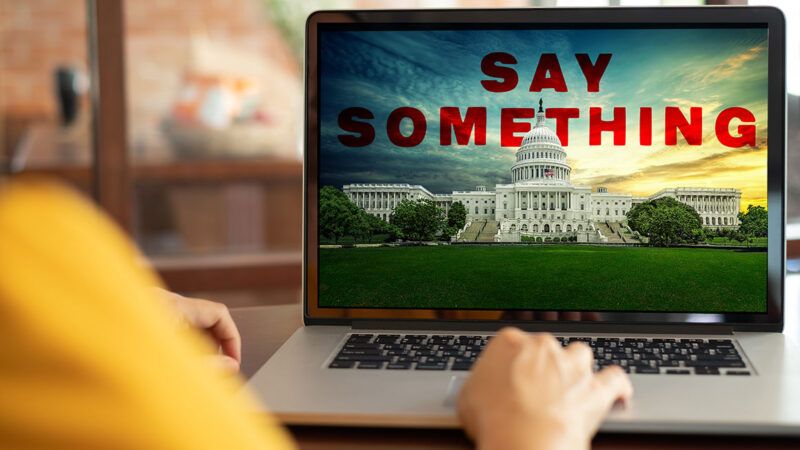'See Something, Say Something' Returns
A new bill repurposes the war on terror's pro-snitching mantra by requiring that tech companies share user data with the federal government.

The popular post-9/11 slogan "See Something, Say Something" is getting a digital makeover in Congress. A bill introduced by Sens. Joe Manchin (D–W. Va.) and John Cornyn (R–Texas) would repurpose the war on terror's pro-snitching mantra by requiring that tech companies monitor their customers more closely and share user data with the federal government. The bill, dubbed the See Something, Say Something Online Act, also would let people report "suspicious" social media posts and any other content they don't like directly to the Department of Justice (DOJ).
A new DOJ office would handle these "suspicious transmission activity reports" (STARs). The tips would be exempt from Freedom of Information Act requests, and tech companies would not be allowed to publicly acknowledge or discuss the information reported.
Each STAR submitted by an internet company would have to contain the name and geographic location of the user in question, along with any other associated metadata and identifying information in the company's possession. All online entities—not just Big Tech platforms like Twitter and Facebook—would be expected to comply with the law.
What kind of content would warrant a STAR? The Manchin-Cornyn bill is (perhaps deliberately) vague about that. The only two concrete examples it mentions are "an active sale or solicitation of sale of drugs or a threat of terrorist activity." But companies would be obliged to report any content that may facilitate, promote, incite, or otherwise assist "the commission of a major crime."
Failure to submit STARs would cost a company liability protection under Section 230, a law designed to distinguish between internet platforms and their users. Section 230 says "no provider or user of an interactive computer service shall be treated as the publisher or speaker of any information provided by another information content provider." In effect, it means individuals are responsible for their own speech, while services that merely act as conduits for that speech are not (with some exceptions). Without Section 230, it would be very difficult for most of today's web platforms to exist.
Section 230 has long been a target of politicians who want more control over, and access to, people's internet speech. The See Something, Say Something Online Act may also be aimed at gutting encrypted communications, since it requires STARs not just for publicly posted content but also for private user communications. The Manchin-Cornyn bill would cover "any public or private post, message, comment, tag, transaction, or any other user-generated content or transmission." Platforms that currently encrypt communications shared directly and privately between users could miss "suspicious" activity and thereby risk potentially running afoul of the law.
"The bill would put online services into the impossible position of determining what is or isn't evidence of a crime, with crippling liability for failing to make the correct determination," said the Internet Association, a tech lobbying firm, in a statement about the bill. "This could result in an enormous amount of user information being shared with the government, with little constraint on its use."
First introduced in September 2020, the See Something, Say Something Online Act got a boost this year from the riot at the U.S. Capitol, which revived interest in old "tough on terror" policies. The bill was reintroduced in late January. But like so many of those measures, this one seems ill-suited to stopping actual terrorism. While the legislation would subject many innocent people to DOJ scrutiny, federal agents probably would be so overwhelmed with reports that separating real threats from the noise would be impossible.
